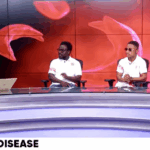
Founder of the FosCel Foundation, Amos Andoh, has revealed plans by the organisation to intensify advocacy and public education on sickle cell disease, particularly in underserved communities across Ghana.
Speaking on JoyNews’ AM Show, on Monday September 29, Mr Andoh noted that despite the growing number of people living with the condition, public awareness remains alarmingly low, particularly regarding the importance of knowing one’s genotype.

“We have seen that we lack education. People are very ignorant about knowing their genotype or anything concerning sickle cell,” he stated.
The FosCel Foundation, which is headquartered in Winneba in the Central Region, is rolling out several new programmes this year, many of which are aimed at increasing understanding, reducing stigma, and improving access to medication for persons living with sickle cell.
A key highlight of these efforts is the upcoming Sickle Cell Funfair, scheduled for December 2025 at the forecourt of the Accra Mall.
“This funfair is going to unite people living with sickle cell to help clear the stigma. We’ll also partner with some pharmaceutical companies in Ghana to make access to medication easier,” Mr Andoh disclosed.
He explained that some medications used in managing the condition can be self-administered at home without a prescription, and ensuring easy access to such drugs is part of the Foundation’s broader health advocacy strategy.
Beyond raising awareness, the event is also expected to provide a platform for individuals particularly “sickle cell warriors” to share their stories, helping to normalise conversations around the condition and foster greater inclusion and empathy within families and communities.
Secretary of the Foundation, Dr Yaw Asamoah, emphasised that genotype testing should become a standard practice in relationships, in order to reduce the prevalence of sickle cell disease in Ghana.

“We want to have a society where every single one, before you say ‘I do’, you know who or what you are going in for,” Dr Asamoah stated.
He explained that the Foundation’s top priority is to ensure that every Ghanaian knows their genotype, describing it as the most effective long-term strategy to ease the burden of sickle cell on both families and the national healthcare system.
“To us, if that one is done, we think the government will have some relief not to even think of sickle cell again,” he added.
Dr Asamoah also revealed that the Foundation is advocating for sickle cell medication to be included on the National Health Insurance Authority (NHIA) list, to help ease the financial strain on affected individuals and families.
